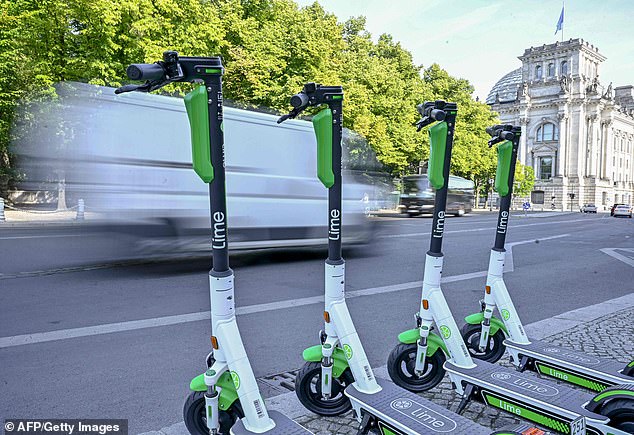‘You can ride a horse on the road so why not an e-scooter?’ asks Halfords boss as sales of the vehicle surge 450% amid growing calls for legalisation
- The privately-owned use of e-scooters remains illegal on public roads in Britain
- Rental e-scooters are permitted though, offering a loophole that many exploit
- Halfords said the Xiaomi Mi 1S and Mi Pro 2 models have been wildly popular
Demand for e-scooters continues to grow precipitously at Halfords, which recorded a 450 per cent boom in sales of them over the last three weeks.
Purchases of the two-wheeled vehicle have soared this year at the retailer and across Britain in response to the coronavirus pandemic as people seek alternatives to using public transport.
This is despite the privately-owned use of e-scooters remaining illegal on British roads.
Only trials of rental e-scooters are currently permitted following government regulations that came into force in early July.

E-scooter expert Matthew Banks: ‘We’ve seen the innovations in e-mobility go from strength to strength and we’ve predicted that e-scooters are likely to be the next big thing for commuters’
Halfords would not give the exact sales figures, but it said two models produced by Chinese electronics giant Xiaomi, the Mi 1S and the Mi Pro 2, have been wildly popular.
The company’s e-scooter expert Matthew Banks commented: ‘We’ve seen the innovations in e-mobility go from strength to strength and we’ve predicted that e-scooters are likely to be the next big thing for commuters.
‘Now we’re beginning to see a tipping point in interest from customers. It was important that these e-scooters to have all the qualities you’d expect from the Xiaomi so that everyone can eventually access all their benefits in one fun package.’
In previous results covering the 20 weeks to August 21, 230 per cent more e-scooters and e-bikes were bought by Halfords consumers, which the firm partly put down to Britons’ growing appetite for staycations.
Trade in bikes and scooters this year has helped offset a fall in business in the group’s motoring division. Nonetheless, up to 60 company stores are set to be shut.
New research published by the Redditch-based business also showed that a majority of the public support their legalisation and would consider travelling to work on one.


New research published by the Redditch-based business showed that a majority of the public support the legalisation of e-scooters and would consider travelling to work on one
The survey, conducted in partnership with pollster YouGov, found that 55 per cent of Britons think e-scooters help the environment, while 53 per cent agree they ease congestion.
Their findings came a fortnight ago after Parliament’s Transport Select Committee released a report urging the government to legalise e-scooters on roads.
It called on the Department of Transport to encourage their use to replace short-distance car journeys and to help reduce carbon emissions and enhance air quality.
Further recommendations included banning them on pavements, giving local authorities the ability to set speed limits and repealing the requirement that riders must possess a driving licence.


Halfords CEO Graham Stapleton: ‘Currently you can legally drive your car or ride your bike – or even saddle up on a horse – on the highway. So why not personal e-scooters?’
Huw Merriman MP, the committee’s chairman, stated: ‘E-scooters have the potential to become an exciting and ingenious way to navigate our streets and get from place to place. If this gets people out of the car, reducing congestion and exercising in the open air, then even better.’
He insisted though that the vehicle’s ‘arrival on our streets doesn’t make life more difficult for pedestrians, and especially disabled people.’
E-scooters in the UK are subject to some of the strictest laws in the world, some of which date back to 1835. Individually-owned e-scooters can only be ridden by people on private land – as long as they have the landowner’s permission.
They are also classed as ‘powered transporters’ and subject to the same rules as motor vehicles, meaning trips on public roads for private use would entail people needing insurance, licensing and registration.
Halfords chief executive Graham Stapleton, noted: ‘Currently you can legally drive your car or ride your bike – or even saddle up on a horse – on the highway. So why not personal e-scooters?’
He added: ‘There is undeniable consumer demand for e-scooters, and many people want the UK laws to catch up with the rest of the world and want to exercise the same rights and freedoms.’
Such laws have severely hindered their use as well as the development of a British e-scooter industry.
By contrast, America is replete with e-scooter firms like Lime, Bolt, and Bird, the latter of whom was the fastest start-up to reach a ‘unicorn’ status value of $1billion.
According to Natwest, the global e-scooter market is forecast to reach £20billion in value in 2025, with East Asia responsible for the greatest share.
Shares in Halfords were down 0.8 per cent to 241.5p at the end of trading.
